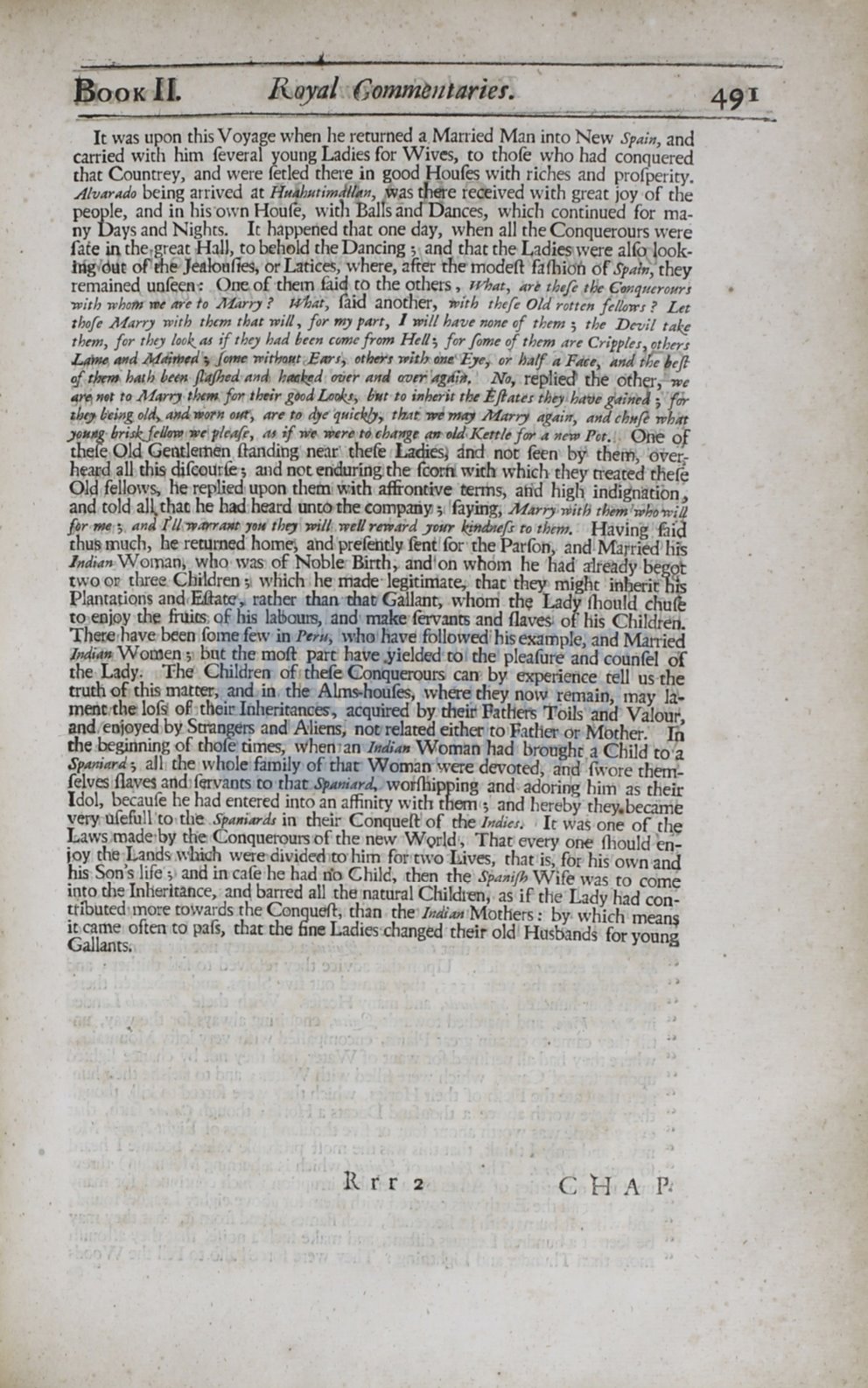

Royal
Gommentarier.
I
491
It was upon this Voyage when he i:emrned a. Married Man into New
Spain,
and
carried with him feveral young Ladies for W1ves, to thofe who had conquered
that Countrey, and were fetled there in good Houfes
~ith
ricpes and profperity.
Alvar11do
being arrived at
Huahuti~allan,
was there received. with gr_eat JOY of the
people, and in his own Houfe,
with
Balls and Dances, whtch continued for ma–
ny Days and Nights.
It happened that one day, when all the Conquerours were
fate
in
the .great Hall, to b€hold theDancing; and that the Ladies were alfo look-
d\:\
of'me
JesJoufres, or Latices, where, after the modefi fa{hion of
Spam,
they
remained uofeeri. One of them
iliaf
co the others,
what, are
thefa the
ConquerourJ
•
~ith
whom
we are to
Marry?
What,
faid
another,
117/th
thefa Old
rotten fe!wws?
Let
thofe Marry
with them
that will, for
my
part, I
will
have none of them; the Devil tale!
them, for
they
look..
tU
if
they
J:ad heen come
from
lf_ell; for
fame
of
them are
Cripples,
other.r
Lff"'8. and
Nttim~;
J0111e
'Witho11t J3nr1,
other.r
'""~one.
E.Je, or half a Fdoe, and the heft
of
tbent
hath
be~
jl:l(/hed
and
h1tJ1Ik,.ad
011er and wer
'4g£
n,No,
replied the other,
we
tj11
116
t
to
Mt1rry
~m
for their good
Look!,
li11t
to inhcr ·t the Eftate.t
they
have gainetl
;
for
"lihtJf
b~mg
old
and
worn
ollf, are to dJe
quick/J,
tbat
we
may Marry
again, and
chH[e
wh11t
.JOH1tg·
bri.rkj'eUow
we ple1tfe,
tU
if
we
were
td Ghttnge
fl'/'
oltf.Kettl~
for a new Pot.
one
of
,
tbefe
Old
Gelltl~rntm
fiandibg near
t>hefe Ladies,
and not feen by thelTI) o'7err
h€~
all this
difeoude ;
and not endhrringi the fcoun.
wwm
which
they
treated thefe
01~
fellows, lie replied upon
them
with
affi-ontive
terms-,
and
high indignation,
and
told
all
tha
he
had
heard
unr.0
tilre
camp>ati~;
faying,
Marry with
tl:Jem
111fwwill
j~r
m4
;
and
t
II
wma11t1 you
they
will well
rt1r:Mrd
.7011r
kjndnefa
to them.
H~ving
£11d
thus-
much,
file
recurned
home}
and
pref
ebtJy
fent 'fur
the Parfon, and Married
his
lndianWoman
who wa of Nuble Birth, and on whom he had crlready beg9t
two
Ol?
thrae Children ; which he
made·
legitimat~
that they
might inberit
l:i~
Plantati0ns and,Ehttr,. rather
than
that
Gallant, whom
the
Lady lhould
chafe
to enj@y the
futi~
of
his
lalbaurs,
and make fuvants and flavesi of his Childteo.
Theoo have been fome few
in
Per11,
wh0 have followed ·his example, and Married
J!U/ian
Women ;
bnt the moft
part have .yieldtrd
to
the pleafure and counfel
of
the
Lady.
rhe Children
of
thefe Conquerours can by experience tell us the
truth of
this
matter, _and
in .
the
Alms-h~es, wher~.
they
now
~amain,
may
la–
ment the lofs
off
their
Inheritances, acqmred by
then+
Fatl1ers Toils
and Val
our,
and enjoyed by
Strangers
and hliens1 not related either to Father
dr
Mother.
fn
the beginning of
thole
times, when an
J11di11n
Woman had
brought
a
Child
to a
Spaniard;
aH
the whole family of
that
Woman were devoted, and fwore them–
falves Haves and
f
{flVants
to
that
Jlp>iniar~
worfhipping and adoring him as their
Idol,
becaufe
he had entered into an affinity
with
them ; and hereby
they.
became
vary
t'lfefull
'to
the
Spaniards
in
their
Conqueft
of the
Indies.
It
was one of
the
Laws made ·by the Conquerours of the new
Wonld
1
,
That every one lhould en–
j-Oy
the Lands V\IDl h were
divided
to
him for
1
t\vo
.ruves, that
is,
for his
own
and
his
Son>s
life;
and
in
cafe he bad tio Child, then the
Spanifh
Wife was to come
into the Inheritance, and barred all the natural Children, as
if
the Lady ·had con–
ttibuted more rowards the Conguefl:, than the
Indian
Mothers
:
by which
m~
it
came often to pafs, that the fine Ladies-ehanged their old Husbands for young
Gallants.
r
..
·. R
r r
2














